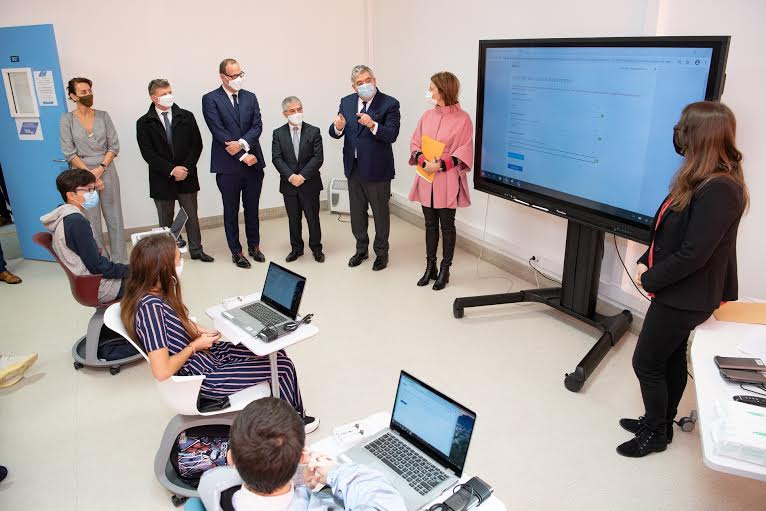The Principality has taken a huge step towards the digitalisation of schools, offering over 1,200 laptops to be used by students and incorporated in to new learning strategies for teachers.
Minister of State Pierre Dartout was personally in charge of handing out the computers on Monday, which were accompanied by textbooks and software chosen by local teachers.
Joining him was Minister of the Interior Patrice Cellario, Interministerial Delegate in charge of the Digital Transition Frédéric Genta, and Director of National Education, Youth and Sports Isabelle Bonnal, who all shared in the experience of seeing a modern middle school class in digital action.
“The Digital College, through its equipment, software and new practices, responds to three challenges: an educational issue by promoting the educational creativity of the teacher and better learning for students, a cyclical issue linked to Covid-19 in order to facilitate educational continuity outside the classroom, and a generational issue to train the talents of tomorrow that the country needs and to offer the best opportunities to our young people, who must master these tools and know how to use them responsibly,” said the Minister of State.
According to Patrice Cellario, parents, teachers and students have been involved in the process since the start of the project so that their needs are fully taken into account.
“To successfully take over this equipment and build skills over time, tailor-made support has been put in place,” he said.
Not only will the teachers be able to offer tailor-made support, they will also be able to teach in more interactive and interesting ways for students who are used to fast-paced environments and are extremely computer savvy.
“For the students, this digital learning method will enrich the approach of a multitude of subjects,” said Frédéric Genta, “such as modern languages by dubbing a film, for example, history to be discovered via online quizzes, French through collaborative writing and audio-visual illustration work or geography by browsing sites in 3D. But the added value will also be expressed in the acquisition of digital skills for the 21st century, in the establishment of pedagogical continuity in the classroom and outside the classroom, with the added bonus of lighter binders since the textbooks are digitised. Finally, for teachers, it will make it possible to vary learning resources, to consolidate their pedagogy and to innovate more easily in their teaching.”
Isabelle Bonnal added, “Thanks to the equipment of college students, we are concretely entering the era of augmented education. It will be possible to capitalise on our strengths while developing new ways of learning. This transition is certainly digital, but it is also educational.”
Monaco schools have already implemented compulsory programming courses starting with kindergarteners, as well as commissioning EduLab Monaco, a centre which trains teachers how to best work with digital education tools for use in the classroom.
Photo ©Manuel Vitali/ Government Communication Department
